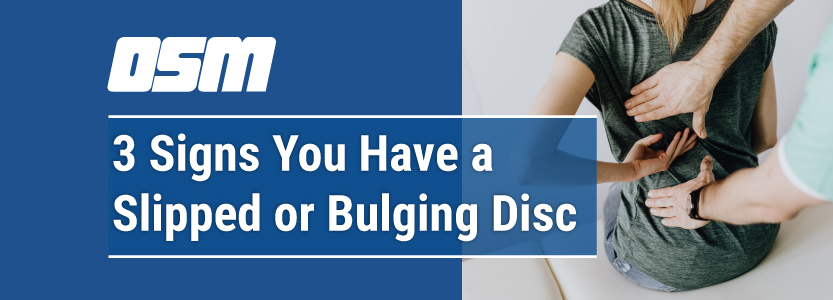3 Signs You Have a Slipped or Bulging Disc
Article features on Spine-Health
When a disc in your lower spine bulges or tears, you may feel pain in your lower back and/or your leg. Here are 3 unique signs of a herniated or protruding disc to help you identify the underlying cause of your lower back problem:
1. Pain while sitting
An activity that exerts tremendous pressure on your lower spinal discs is sitting. If you have a herniated or bulging disc, this increase in pressure within your disc may cause the bulge to become more pronounced, which may aggravate your lower back pain when you sit.
2. Radiating pain into your leg (sciatica)
The discs in your lower back typically herniate or bulge in the posterior (back) and/or lateral (side) region, which is in close proximity to your spinal nerve roots. Herniated discs may affect these nerve roots through one or both of the following 2 methods:
- Direct compression. When the disc’s bulge or leaking inner contents directly press on a spinal nerve root as it exits the spinal canal.
- Chemical irritation. When a herniated disc leaks out acidic chemical irritants from the disc material, which may cause inflammation and irritation in the area around the nerve root.
The function of the affected nerve root is then altered, and you may feel a burning pain along with numbness, weakness, and/or tingling along the front and/or back of your thigh, leg, and/or foot. These symptoms are commonly referred to as sciatica. The symptoms and signs of sciatica typically affect one leg at a time.
3. Pain aggravated by specific activities
Your lower back pain and/or sciatica may worsen when you perform certain activities, such as:
- Bending forward/down
- Lifting a heavy object
- Pushing or pulling a heavy object
- Coughing
- Sneezing
Lumbar herniated disc pain usually comes on fast. In most cases, there is no single, clear reason for the pain, such as a specific injury or traumatic event. Yet, the pain feels sudden.
This condition can be very painful, but for most people, the symptoms don’t last too long. Nearly 90% of people who experience painful lumbar disc herniation report within 6 weeks that they no longer feel the pain, even if they received no medical treatment for it.
Warning signs and when to see a doctor
Visit your doctor if you exhibit these 3 telltale signs of a herniated disc. Your doctor may recommend a combination of nonsurgical treatments, such as pain-relieving medications and a guided physical therapy program, as well as referral to an interventional pain specialist for image-guided lumbar injections—to help decrease inflammation and relieve the pain.
If you experience any difficulty in controlling your bowel and/or bladder movements, numbness in your inner thigh and genital area, and/or problems in starting urination, consult your doctor immediately. These symptoms and signs may indicate cauda equina syndrome, a serious medical emergency, which is possible with certain severe lower back disc herniations.
The Orthopedic & Sports Medicine Center of Oregon is an award-winning, board-certified orthopedic group located in downtown Portland Oregon. We utilize both surgical and nonsurgical means to treat musculoskeletal trauma, spine diseases, sports injuries, degenerative diseases, infections, tumors and congenital disorders.
Our mission is to return our patients back to pain-free mobility and full strength as quickly and painlessly as possible using both surgical and non-surgical orthopedic procedures.
Our expert physicians provide leading-edge, comprehensive care in the diagnosis and treatment of orthopedic conditions, including total joint replacement and sports medicine. We apply the latest state-of-the-art techniques in order to return our patients to their active lifestyle.
If you’re looking for compassionate, expert orthopedic surgeons in Portland Oregon, contact OSM today.
Phone:
503-224-8399
Address
1515 NW 18th Ave, 3rd Floor
Portland, OR 97209
Hours
Monday–Friday
8:00am – 4:30pm



